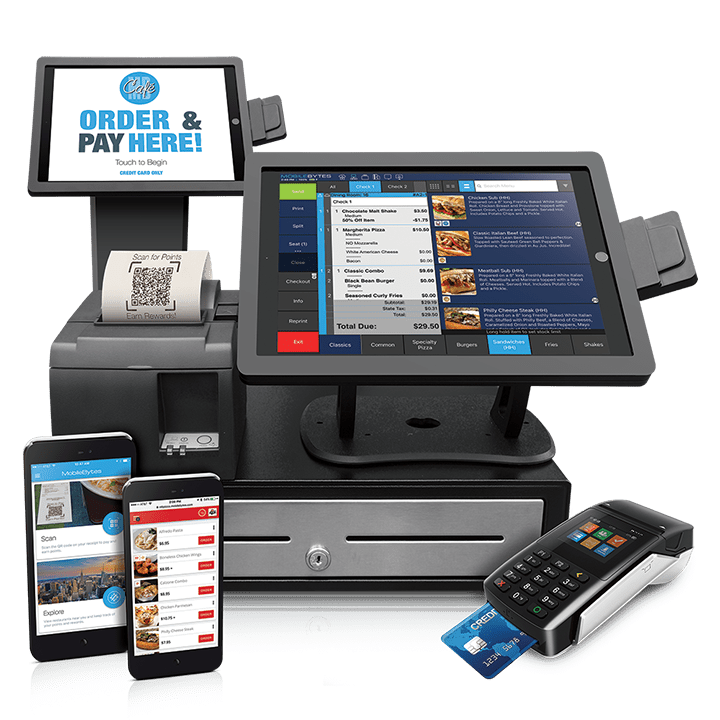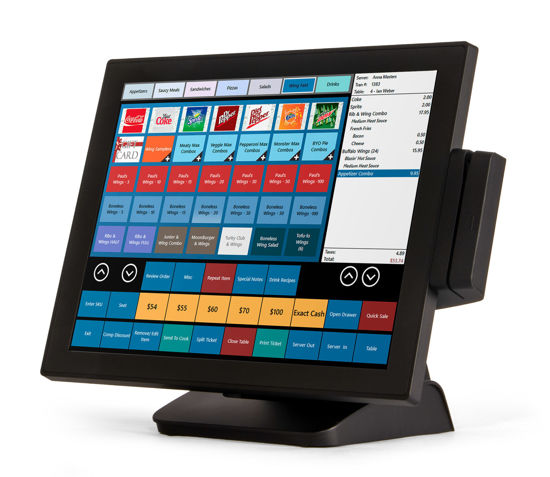Pos for Dummies
Pos for Dummies
Blog Article
The Best Guide To Point Of Sale

Point of Sale Software: Retail Point-Of-Sale Solutions Streamline Transactions
Getting My Pos Software To Work

Hardware Elements of a Point of Sale System What makes a POS system tick? It's not simply software; the hardware plays a starring function. Consider it as the body to the software application's brain. Without the best hardware, even the most advanced POS software application is simply a pretty face. Essential POS Hardware So, what are the must-haves? Let's simplify. The central processing unit, frequently a computer or tablet, is the heart of the operation. The monitor or touchscreen show enables personnel to interact with the system. A barcode scanner accelerate the checkout procedure. Remember the days of by hand entering each code? The trusty invoice printer supplies clients more info with a record of their purchase. A money drawer keeps your money safe and organized. A card reader enables clients to pay with credit or debit cards. Diving Deeper: Beyond the Essential But wait, there's more! Depending on your organization, you might require specialized hardware. For instance, a dining establishment might include kitchen area printers to relay orders, while a retail store might utilize label printers for product tagging. Ever wonder how your regional bakeshop quickly prints those delicious-looking labels? Choosing the Right Hardware: A Balancing Act Selecting the best hardware isn't just about buying the most costly equipment. It's about discovering the sweet spot between functionality, toughness, and budget plan. A little company just beginning might choose a more standard setup, while a high-volume retailer will require robust, high-performance makers. Is it much better to purchase new or used? Consider your options carefully. A brand-new system provides the most recent technology and warranty security, but a reconditioned system can save you cash. The Future of POS Hardware What does the future hold? Expect to see even more integration with mobile phones, biometric scanners for worker authentication, and advanced analytics control panels displayed on bigger, clearer screens. Imagine a world where inventory is immediately upgraded in real-time as items are scanned-- a world where you can track your very popular item from anywhere in the world. The possibilities are unlimited, and the hardware is continuously progressing to satisfy the needs of today's services. Are you prepared to upgrade your point of sale system?
Software Application Characteristics and Capabilities: The Heart of Your POS System
Ever see an experienced barista glide through a hectic morning rush? Their secret isn't simply caffeine; it's a smooth dance with their POS system. The software is the conductor of your organization symphony, orchestrating whatever from sales to stock. But what notes should you be listening for? What abilities genuinely matter in today's market?
Stock Management: Beyond Counting Beans
Forget spreadsheets that haunt your dreams. Modern POS systems offer real-time inventory tracking, alerting you when your stock of artisanal coffee beans dips precariously low. Consider it as a digital guardian angel, preventing those uncomfortable "Sorry, we're out!" moments to customers. What if you could likewise anticipate need based on historical data? Many systems now provide forecasting tools, an effective weapon versus overstocking and lost sales. This helps avoid the dilemma of lacking popular products or collecting excess stock of slow-moving items, both of which can constrain cash circulation and space.
Sales Reporting and Analytics: Decoding the Data
Sales data is the brand-new gold, and your POS system is the miner. Forget feeling in one's bones how much you offered today. Dive deep into the information to reveal patterns, identify your best-selling products, and understand customer habits. Which menu product sets completely with the day-to-day special? Which promotion resonated most with your clientele? These insights are not simply interesting; they're actionable intelligence. Without reputable sales reporting, navigating the intricacies of company decision-making becomes like sailing without a compass, increasing the possibility of errors and missed opportunities.
Consumer Relationship Management (CRM): Building Bridges, Not Walls
Remembering a regular customer's name and favorite order is charming, but scaling that personal touch is difficult. POS systems with CRM abilities enable you to track client purchase history, preferences, and even birthdays. Envision automatically providing a discount on their birthday-- a little gesture that promotes commitment and motivates repeat organization. However there is the prospective snag of bad information quality, which can cause incorrect customer profiles and ineffective marketing efforts.
Payment Processing: Simplifying the Deal
The checkout experience can make or break a sale. Smooth integration with various payment methods-- credit cards, mobile wallets, even copyright-- is non-negotiable. Can your system handle split payments? Does it offer safe tokenization to protect client information? A clunky payment process resembles hitting a sour note in your service symphony, possibly interfering with the whole performance. Guaranteeing compatibility with developing payment innovations and adherence to security requirements are paramount for keeping client trust and functional efficiency.
Staff Member Management: Keeping the Group in Sync
From clocking in and out to handling authorizations and tracking performance, worker management includes simplify operations and enhance accountability. Is scheduling a problem? Lots of POS systems provide incorporated scheduling tools, enhancing staffing levels based upon anticipated demand. A common obstacle that is typically neglected is the obstacle of integrating staff member management performances with payroll systems, which can result in mistakes and ineffectiveness in wage estimations.
Advanced Characteristics: Leveling Up Your Operations
- Table Management: Perfect for dining establishments, this feature permits you to picture your dining-room, track table status, and handle reservations.
- Loyalty Programs: Reward your best clients and motivate repeat company with incorporated commitment programs.
- Online Purchasing Combination: Effortlessly incorporate your POS system with online purchasing platforms to broaden your reach.
Choosing the best POS system has to do with more than simply functionality; it's about finding a partner that can grow with your company. Consider your existing requirements, anticipate future growth, and do not hesitate to ask the difficult concerns. The right software can change your company from a chaotic cacophony into an unified work of art.
Industry-Specific POS System Applications
Think about the regional bakery, busy with early morning clients yearning fresh croissants. A generic POS system might handle transactions, however can it manage complex recipes, track active ingredient inventory, or instantly change production schedules based on sales data? Probably not. That is where the beauty of industry-specific POS systems shines.
Restaurants and Hospitality
For dynamic dining establishments, speed and precision are paramount. The number of times have you seen servers juggling orders, modifications, and splitting bills, all while trying to supply excellent service? A restaurant POS system simplifies these procedures, enabling table management, cooking area order tickets, and even online purchasing integration. These systems typically include functions like ingredient-level inventory tracking, important for managing food costs and lessening waste. Ever wonder why your favorite meal is in some cases unavailable? It might originate from an absence of correct stock management.
- Table Management
- Kitchen Order Tickets
- Online Buying Combination
- Ingredient-Level Inventory Tracking
Retail Solutions
Retail, with its varied stock and consumer interactions, demands a different set of tools. Envision a store clothing store having a hard time to track sizes, colors, and seasonal collections using a fundamental checkout system. An industry-specific retail POS system uses features like barcode scanning, client loyalty programs, and detailed sales reporting. These systems can even incorporate with e-commerce platforms, providing a seamless omnichannel experience for clients. Did you know some retail POS systems can anticipate future sales trends based on historical information? Now that is effective!
The Perils of an Inequality
Picking the wrong POS system can create substantial functional hurdles. A clothing store using a dining establishment POS, for example, would find it inappropriate for handling inventory with sizes and colors. The absence of proper reporting and analytics could lead to misinformed buying decisions and lost profits. The result could be comparable to attempting to fit a square peg in a round hole.
Key Considerations
Picking an industry-specific POS system needs cautious examination. Believe about your business's distinct needs and functional workflows. Does the system integrate with existing software? Does it offer the essential reporting capabilities? Is it scalable to accommodate future growth? A well-chosen POS system is not simply a transaction tool; it's a strategic asset that can drive efficiency, improve client satisfaction, and eventually, improve your bottom line. Keep in mind, it is an investment in your service's future, not just an expenditure.
Security Factors To Consider for Point of Sale Systems
Ever heard the tale of the mom-and-pop store that lost whatever since of a single, overlooked security flaw in their POS system!.?. !? It's a cautionary tale, and it highlights a critical aspect often eclipsed by the appeal of fancy functions and structured operations. The truth is, a POS system is only as excellent as its security. What good is a system that crunches numbers in a flash if it allows wrongdoers to swipe consumer's information simply as quickly?
The Vulnerability Minefield
The digital landscape is a battleground. Every POS system, regardless of size or sophistication, is a possible target. Are you really prepared for the hazards hiding around the corner? The genuine pinch comes when you find that your out-of-date software has an open hole that hackers can make use of, turning your company into an unwitting accomplice in identity theft. The problem is that hackers are crafty and are always changing their methods.
Typical Security Gaps and Expert Tips
- Weak Passwords: "Password123" isn't cutting it. Use strong, unique passwords for all POS system accounts and alter them frequently. Two-factor authentication is a must.
- Unsecured Networks: Your Wi-Fi is like leaving the front door open. Secure your network with strong file encryption (WPA3 if possible) and think about a separate network for your POS system.
- Outdated Software Application: Software suppliers spot security holes all the time. Failing to upgrade resembles welcoming trouble. Set up automated updates or schedule routine maintenance.
- Employee Training: Your personnel is your first line of defense. Train them to recognize phishing attempts, secure passwords, and report suspicious activity.
Information File Encryption: Your Guard Against the Dark Arts
Consider information encryption as a secret code. It scrambles delicate information, like credit card numbers, making it unreadable to unauthorized users. Without file encryption, your consumers' financial details are like sitting ducks, ripe for the selecting by cybercriminals. It's not practically protecting your consumers; it has to do with protecting your track record and preventing hefty fines.
PCI Compliance: The Rulebook You Can't Neglect
If you accept charge card, you're bound by the Payment Card Market Data Security Standard (PCI DSS) It's a set of security requirements created to protect cardholder information. Stopping working to comply can lead to fines, penalties, and even the loss of your capability to process charge card payments. It's a headache, yes, however it's a required one. Consider PCI compliance as the expense of doing company in the digital age.
Consider this: every deal processed through your point of sale is a prospective entry point for harmful actors. By implementing robust security procedures, you're not simply safeguarding your organization; you're safeguarding your clients' trust and guaranteeing the long-lasting viability of your operations. The security of your POS system isn't simply a technical problem; it's an organization vital. It requires consistent caution, proactive measures, and a dedication to remaining ahead of the curve.